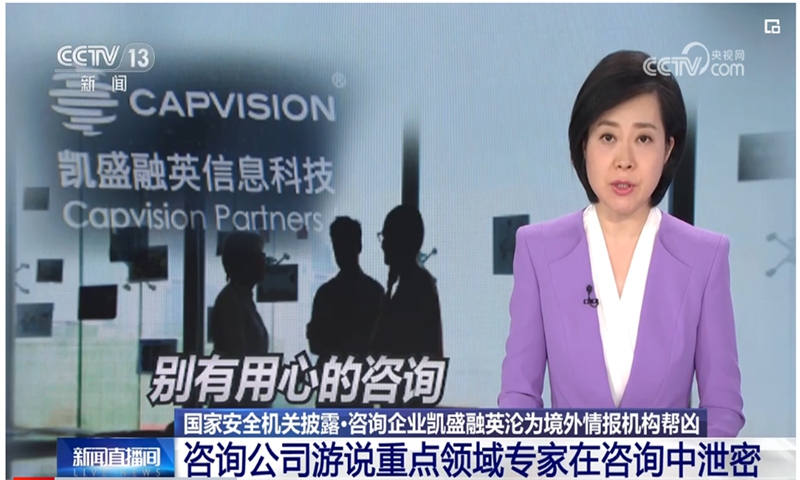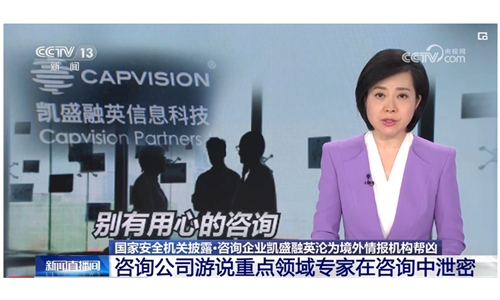Anti-spy actions send warning to anti-China forces, not legitimate foreign businesses

Photo: Screenshot of the report for Capvision from China Media Group
A detailed report by China Media Group (CMG) detailing Chinese national security and other authorities' recent law enforcement action against consultancy Capvision has drawn widespread attention from foreign media outlets and representatives of certain Western business groups in China. But instead of focusing on the facts and merits of the case against Capvision, they resorted to the type of hyperbolic, biased and vicious rhetoric aimed at smearing China, with which we have become all too familiar.Here are some examples of such rhetoric: "Capvision: China raids another consultancy in anti-spy crackdown," the BBC declared. "China consultancy crackdown sends jitters across foreign business," Reuters asserted. "'Everybody is worried': China raids offices of consultancy firm Capvision in widening industry crackdown," CNN claimed. Just by reading these headlines, it's obvious that these are not objective, fair and balanced coverage of what actually happened, but sensationalized and biased reports - an attempted hatchet job on China's law enforcement actions and its broader business environment.
Here is what actually happened: On Monday evening, CMG aired a 15-minute report on Chinese authorities' law enforcement action against Capvision. In great detail, the report chronicled how the consultancy received tens of millions of dollars from foreign clients over the years for consulting projects, some of which were sensitive and closely related to foreign governments, military and intelligence agencies. It also offered details of how the firm induced domestic experts in key fields such as national defense and high-tech sectors to provide state secretes and intelligence to overseas entities.
In one example, a former senior researcher at a major state-owned enterprise (SOE) was "persuaded" by Capvision downloaded nearly 5,000 documents via the firm's internal network and provided three pieces of state secret information, 13 pieces of intelligence and 18 pieces of commercial secrets to foreign entities. The former researcher was sentenced to six years in prison. Like in any country, there are specific laws and regulations in China for employees at Chinese SOEs and other government agencies to protect state and commercial secrets. In the case of Capvision, authorities uncovered many complex foreign entities that, in order to evade China's laws and regulations, conceal their foreign backgrounds and use domestic consulting firms to steal state secrets and intelligence related to vital areas, according to CMG.
For any fair-minded person, all of these key facts and details should indicate that the case against Capvision is normal law enforcement action aimed at protecting China's national security. It is not an industry-wide "crackdown" campaign targeting foreign consulting firms, as these sensational foreign media reports suggest. It is in no way "a warning to foreign companies operating in China," as some "foreign pundits" claim.
Admittedly, this does send a "warning" or "jitters," but the target is anti-China forces in the West that are constantly expanding their spying activities under the guise of commercial projects to steal vital state and commercial secrets from China, as part of their broader attempt to contain China's development. It is a stern warning to these forces that Chinese authorities will further step up their efforts to crackdown on illegal malign actions in China.
Specifically, China will implement a revised Counter-Espionage Law on July 1, which refines the definition of espionage, specifying acts such as carrying out cyberattacks against state organs, confidential organs or crucial information infrastructure as acts of espionage. Among other changes, the revised law also properly expands the scope of targets of espionage, with all documents, data, materials and articles concerning national security and interests included for protection.
The upcoming implementation of the revised anti-espionage law and recent law enforcement actions surely indicate that China is intensifying its anti-spy efforts to protect national security, as the US-led West is stepping up its espionage activities in China. It must be pointed out that such moves are completely in line with international standards. All countries have similar anti-espionage laws and regulations in place and take law enforcement actions to protect their national security. Some, noticeably the US government, actually constantly abuse such laws and regulations to target other countries, businesses and even their own citizens in espionage and surveillance activities.
In a way, recent hype by foreign media outlets and manufactured "concerns" raised by some representatives of certain Western business groups actually underscored the necessity for China to step up anti-espionage efforts. The more outraged these anti-China forces are about China's normal efforts to protect its national security, the more it shows that China's actions are hitting the real targets. Foreign businesses that are involved in such malicious activities should be worried. But for foreign businesses that are operating in China normally and legally, they have nothing to worry about. Indeed, the crackdown on these criminal activities is good news for the industry and their businesses.
The author is an editor at the Global Times. bizopinion@globaltimes.com.cn


